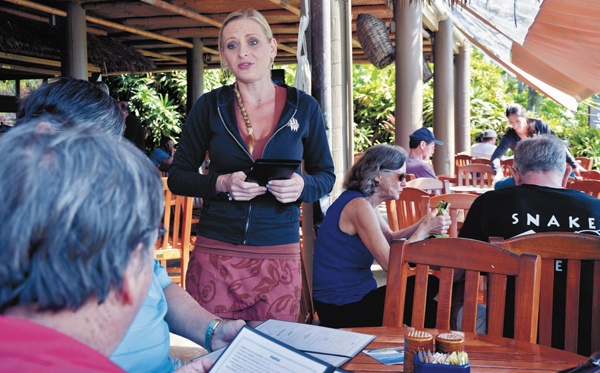LIHUE — House and Senate lawmakers on Tuesday passed a pair of bills aimed at increasing the state’s minimum wage. What is uncertain, however, is which of the proposals will survive and pass through the Legislature, if any at all.
LIHUE — House and Senate lawmakers on Tuesday passed a pair of bills aimed at increasing the state’s minimum wage.
What is uncertain, however, is which of the proposals will survive and pass through the Legislature, if any at all.
“I think the job is to just hopefully find the balance that pays a decent wage, and in the meantime, craft something that works for business because we need to have entrepreneurs who are willing to take risks, start businesses and create jobs so that people can work,” Sen. Ron Kouchi, D-Kauai-Niihau, said.
Although many lawmakers agreed the minimum wage should be raised, many said they had concerns on how to address the most divisive part of each bill: tip credit limits — the amount businesses are allowed to deduct from a tipped employee’s wages.
The Senate’s bill, SB 2609, would raise the current minimum wage of $7.25 by 95 cents each year until it reaches $10.10 by 2017. It would also change the state’s 25 cents tip credit, according to a draft version of the bill.
That bill passed swiftly through the Senate on a 24-1 vote. But the passage of the House’s bill, HB 2580, was not as easy.
The current version proposes to raise the minimum wage by 50 cents to $7.75 on Jan. 1, 2015, and then 75 cents for every year afterward until it reaches $10 by 2018.
It would also increase the tip credit by 25 cents each year until it reaches $1 by 2017 — if the gross amount an employee receives from wages and tips for a tax year is at least 250 percent of the poverty level as determined by the Director of Labor and Industrial Relations.
Rep. Jimmy Kunane Tokioka, D-Koloa-Wailua, said he supports a minimum wage increase but is concerned that businesses will be burdened by the House’s proposal for tip credits.
Under the proposed House bill, the tip credit would be adjusted for certain employees, whose income exceeds $33,550 — a unique model that, some labor advocates say, will help shield low-wage workers.
“I think the wording in this bill will really, really hurt the small little restaurants — the Washington Saimins, the small Chinese restaurants throughout the state of Hawaii — because what they’re going to have to do to figure this out is hire somebody,” Tokioka said on the House floor. “I know that there was a lot of thought put into this but I do know that restaurants survive on pennies and nickels.”
Despite these concerns, many lawmakers said they are still open to compromise as both houses evaluate possible changes.
“There’s posturing and different techniques that people use as far as how to get to resolution, so I think that we’re going to wind up with some level of an increase,” Kouchi said. “It’s determining what that will be and we’ll certainly be hearing from a lot of people weighing in on what’s appropriate.”
But Shannon Perreira, human resources coordinator for Duke’s Kauai, said certain parts of the bills could have a negative impact on the restaurant.
Company officials, she said, support increasing the minimum wage but would like to see some changes made to language in the bills dealing with the tip credit.
Perreira estimates that tipped employees, or about 60 percent of all employees, at the restaurant chain’s Lihue location are paid minimum wage. With tips included, some of the restaurant’s servers and hostesses make about $15 to $30 an hour.
“We don’t consider our tipped employees to be low-wage earners and don’t want to increase the gap in earnings between tipped and non-tipped employees,” Parreira said. “Without a tip credit, our tipped employees will be the ones getting an increase when minimum wage goes up. We don’t believe this is the intent of the bill. We want the increase to go to our kitchen employees who do not receive tips. An increased tip credit would create more equity in wages for our staff.”
• Darin Moriki, county government reporter, can be reached at 245-0428 or dmoriki@thegardenisland.com. Follow him on Twitter at @darinmoriki.


